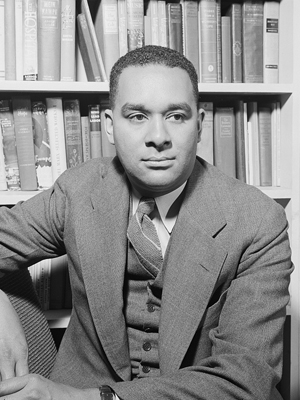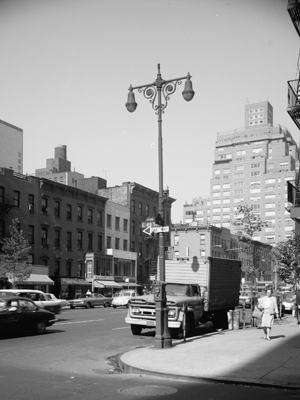
Your complimentary articles
You’ve read one of your four complimentary articles for this month.
You can read four articles free per month. To have complete access to the thousands of philosophy articles on this site, please
Existentialism & Life
Existentialism from an African-American Perspective
Roger Karny takes another look at liberty and alienation.
The New York Times called the 1953 novel The Outsider by African-American author Richard Wright (1908-1963) “prophetic… a book people should ponder”. The Outsider’s protagonist, Cross Damon, is an African-American intellectual who majored in philosophy at the University of Chicago. Victimized by white oppression, he is melancholy, a ‘lover of ideas’, brooding constantly over his emotions and analyzing his life circumstances. (Wright thinks his own deep, psychoanalytic thoughts through Damon, and it comes off well.) Married while still young without really knowing what he was getting into, Damon holds a low-paying job at the local post office on the south side of Chicago. He is now estranged from his wife, who refuses to divorce him, and has unknowingly taken up with an under-aged girl. The girl threatens to take him to court for statutory rape if he doesn’t divorce his wife and marry her. To finance his out-of-control life, he has to continually take out loans, thus putting himself in unending debt. What to do?
Well, fortuitously (or not) Damon climbs aboard a Chicago train that crashes horribly, killing many passengers but leaving him unharmed. He comes up with the idea of making it look as if he himself has perished so as to escape his problems. Everyone, including his family and the authorities, believe the ruse, and he slips away from it all to New York City and seemingly a brand new life and identity.
He’s free! Free to start a new life and re-create his identity. How much more existential than that can you get?
Jean-Paul Sartre believed that ‘existence precedes essence’. In other words, Sartre explained, “Man is nothing else but what he makes of himself.” You are responsible (and empowered) to create who you are, continually. Similarly, Damon believes he’s “like a writer constructing a tale.”

Richard Wright by Gordon Parks 1943
The author, Richard Wright himself fled the U.S.’s racial inequality and hatred, and FBI surveillance, to live in Paris, where he wrote this book. There, besides Sartre, he hob-knobbed with Albert Camus and Simone de Beauvoir, and other noted authors, such as Andre Gide, Arthur Koestler, and Gertrude Stein. They all influenced his way of thinking. The Outsider speaks from an existential framework about the oppression of black people and the resulting violence and crime – something no black writer had tried to do before.
Alienation and the quest for personal freedom are two main existential themes, which Wright explores in this novel. So although in New York Damon does seemingly have complete freedom from his old identity, he finds that he is imprisoned inside the new identity he has created. He cannot risk telling anyone about his real situation, and must fabricate a believable past for himself. Therefore, he’s alienated from society, from all who have known him, and really, from himself as well. He feels this alienation particularly after witnessing his own funeral and watching his family mourn him. His faked death in a sense becomes real to him. He experiences the existential ‘dread’ of which Søren Kierkegaard wrote. From this, and other harrowing experiences which follows, he intuitively learns what it means ‘to be or not to be’ – to be alive! But he pays a price for his freedom and knowledge too – a loss of purpose and integrity.
So maybe he’s too free. He must make alone many more decisions than other people do with support. He is in effect forced to decide for himself and by himself what is good or evil, and therefore must bear the consequences alone too. As Sartre claimed, “Thus we have neither behind us, nor before us, in a luminous realm of values, any means of justification or excuse. We are left alone, without excuse. That is what I mean when I say that man is condemned to be free.”
Along with Damon’s disengagement and isolation comes an avoidance of reality. He seeks refuge with the Communist Party; but finds they are devious, cynical, power-hungry, cold, and vicious. They take him in just to indoctrinate and use him. He’s caught in many traps and crossfires. He feels compelled to murder four people: a friend in Chicago who discovers he’s not really dead; a fascist, negro-hating landlord; a Communist leader who the landlord was in a death struggle with; and a second Communist leader. But he’s not a savage, killing indiscriminately. His reasons make sense to him and arise from the situations that confront him. The revulsion planted in him by people who want to enslave him, remove his freedom, psychologically or socially, drives him to it. The fascist landlord’s death is almost a given, as this man hates negroes and had already threatened Damon with a gun. But why kill the two Communists? The situations force him to do so, as with the friend who could have exposed his ruse.

New York, back in the day
Wright himself was associated with the Communist Party for quite a while. He was familiar with its methods and ideology. When in 1940 he wrote Native Son, he saw the Communists as having an answer not only to the on-going oppression of African-Americans but also to the plight of all underclasses. In Native Son, a leftist attorney, Max, is the only white person with any shred of political power who’s willing to defend protagonist Bigger Thomas in court after Thomas is driven (also by circumstances) to murder a white woman. Max delivers a moving argument before the judge, condemning white society’s oppression of blacks, but to no avail. Bigger Thomas dies in the electric chair, a victim of hatred, greed, and mob psychology. But by the time he wrote The Outsider, Wright saw Communism in a very different light. As for existentialism, Wright is brilliant in his use of it in this book to illustrate the African-American plight in the early-to-mid-twentieth century.
Ralph Ellison employs existentialism to this purpose too, in his 1952 novel Invisible Man. Due to his friendship with Wright, Ellison came to regard Kierkegaard and the Russian existentialist novelist Fyodor Dostoevsky as important influences. Ellison’s invisible man lives in what he calls ‘a hole in the ground’ in the basement of a building. He feels the humiliation that Dostoevsky’s character feels in Notes from Underground (1864), that character also claims he lives in a ‘stinking’, ‘musty hole’. Ellison portrays his unnamed character’s existential anguish in terms of his ‘invisibility’ within white society. No one even cares to acknowledge his presence, even his existence. The character says he’s invisible “simply because people refuse to see me… because of a peculiar disposition of the eyes of those with whom I come in contact with.” It is “a matter of a biochemical accident to my epidermis.” The man finds this world ‘absurd’, as Camus, Wright, and other existentialists have also labelled it. He must find some way to be true to himself to live in such a world, and act so as to gain some measure of freedom…
Assessing Existentialism
Is existentialism the answer to all humanity’s difficulties? Or is it maybe just helpful in some instances?
Coming into vogue after the Second World War and the immediate defeat of right-wing totalitarianism, mass nationalist movements, and their organized murder and hatred, existentialism sought to provide a philosophical alternative to mass ideologies: looking within and using one’s own intelligence and free will to roll out a life in the midst of the chaos and farce. However, today, perhaps, that attitude has mutated into a dangerous individuality where the person is all that matters. People act as they alone see fit, and the community is really subservient to their wants. Furthermore, many existentialists purport to be atheists, and the freedom they seek to create in themselves leaves no room for faith in a greater being. This was condemned early on by the Catholic Church, and later Communists rejected the idea of elevating the individual over the Party. In fact, the Catholic existential philosopher Gabriel Marcel once denounced Sartre as a ‘systematic blasphemer’ and ‘corrupter’ of youth due to his ‘pernicious lessons and most poisonous advice’! So, not all existentialists are atheists; existentialism has had its Christian side too. Its earliest proponent, for instance, Søren Kierkegaard (1813-55), was a Danish Christian, albeit one who eschewed orthodoxy in favor of free-thinking. Fyodor Dostoevsky, the author of such early existential works as The Brothers Karamazov and Crime and Punishment alongside Notes from Underground, was a Russian believer. Richard Wright himself grew up inside the black church, but then later cast a dubious eye on much of its teachings and even the existence of God, coming across as an agnostic or even atheist in the two cited novels. Moreover, existentialists have had equally great disparity among themselves as to what the philosophy really means.
So where does this leave Cross Damon, anti-hero of The Outsider ? He’s an African-American facing mid-twentieth-century white bigotry, misunderstanding, and hatred. Nevertheless, he strives in his own way to be an acknowledged human being in a system that only wants to make him less than one. He’s highly intelligent, coerced into unacceptable circumstances, yet decides to create himself, and secure for himself some manner of self-respect and dignity – even though he believes he must kill, lie, and break all societal norms to do so. Is it a Christian way to live? Decidedly not, at least on the surface. Yet Damon is forced to exist under demonic pressures not of his own choosing, and must make choices outside the box of white society, and of dogmatic, stale, myopic Christianity, both white and black.
An introductory note to Wright’s 1945 autobiographical novel, Black Boy, quotes Oliver Wendell Holmes: “It is so much easier to consign a soul to perdition or to say prayers to save it, than to take the blame on ourselves for letting it grow up in neglect and run to ruin. The English law began, only in the late eighteenth century, to get hold of the idea that crime is not necessarily a sin. The limitations of human responsibility have never been properly studied.” Is it possible that, to a just God, Damon, like Bigger Thomas, must be judged in ways that only God can judge?
I don’t know. I’m not God. And I don’t want to be.
© Roger Karny 2021
Roger Karny is retired, occasionally writes, and lives near Denver, Colorado, USA.









